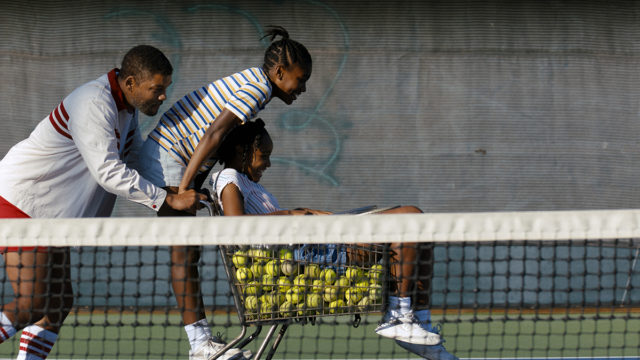Richard Williams takes center court and center stage in “King Richard.”
Played by Will Smith, the titular father figure is in full view in the new tennis biopic executive produced by Venus and Serena Williams. The film follows Richard and his wife Oracene (Aunjanue Ellis) as they raise young Venus (Saniyya Sidney) and Serena (Demi Singleton) to become the best players the sport has ever seen. As the plot grows heavy with emotion and determination, “King Richard” manages to affectionately navigate a loving family and the exclusive world of tennis.
Opening with a montage of Richard networking with various tennis pros in an attempt to find a coach for Venus and Serena for free, the movie indirectly establishes his grand vision for the audience. It’s clear from the outset, then, that this is Richard’s story – not Venus’ or Serena’s, which feels like a deliberate move to leave the door open for their own storylines in the future. The film blends the characteristics of the touching father figure and the often-controversial businessman with grace, perhaps in part because the Williams daughters were highly involved with the making of the film, but the choice nonetheless feels honest and vulnerable.
However, “King Richard” moves beyond just athleticism or the business of professional sports, filtering tennis topics through the family’s conversations and motivations. As the Williams move from Compton to Florida, a slew of different locations and tennis lingo are thrown at audiences, but the film cuts through the jargon with Richard’s shouted advice or acted-out tips.
The same goes for the matches, which unfold with a slight cinematic touch. Because of the real-life Richard Williams’ well-known inability to be in the stands as his daughters play, the camera cuts back and forth to the center court match and Richard’s commentary as he watches the hallway TV, clarifying a scene that otherwise would’ve played out too close to a televised match.
[Related: Film review: Marvel’s ‘Eternals’ features stellar cast but disengages viewers with dense plot]
The attention to realistic detail extends to the aesthetics of the film. Smith is seen almost exclusively in a white and red outfit when in Compton, donning short shorts and knee-high socks whose stripes match his iconic jacket. The attire complements the red and white van Richard totes his daughters around in, which later makes an easily distinguishable return at the film’s end as Richard’s original home videos roll.
These home videos are all the more entertaining to viewers as they recall details like Venus and Serena’s various hairstyles as well as the fictionalized recreations of Richard’s “media training” for the girls that are threaded throughout the movie. Audiences see Smith’s Richard as he records the practices he and coach Paul Cohen (Tony Goldwyn) led, and at the end, viewers get to watch the original videos as a highlight reel of lovable coach Rick Macci’s mustache or Venus’ sassy fur coat.
But reflecting reality comes with a less lighthearted cost. By including Richard’s documentation throughout, the film also depicts the looming media presence surrounding the family, especially when in Florida. Encouraged by Rick Macci (Jon Bernthal) but kept out of the tournament circuit by Richard, Venus is hounded by the press for the controversial and unconventional decision to not play junior’s tennis. But while the actual media during the ’90s was almost always biased against the Williams and fueled by racism, the film displays Richard’s complicated character and decisions with nuance.
[Related: Film review: Metatextuality meets memory in sequel film ‘Souvenir: Part II’]
And yet, while a film about a protective father, “King Richard” is also about childhood innocence. The childlike whimsy in the five sisters – not just Venus and Serena – charms audiences as they chant, “Moded, corroded, your booty exploded.” The film also transforms a former so-called scandal with falling beads into a moment of self-esteem surrounding Venus’ hairstyle for her center court debut at the Bank of the West Classic.
In “King Richard,” indirect commentary is made on how the white sport – or white spaces in general – do not accept Black women’s hair by framing the scene with motherly love and personal pride. Oracene tenderly braids Venus and Serena’s hair in matching white beads, encouraging Venus to confidently strut onto the court for her second pro appearance.
In moments like these, “King Richard” demonstrates how sports biopics have the potential to rewrite history. Athletes’ wins and losses may be why a match is televised, but what people remember are the characters built on the screens – such as John McEnroe (Christopher Wallinger), who made a brief appearance, and his infamous temper. By showing the same game through the same medium but with a different lens, viewers’ understanding of great athletes can shift. “King Richard” can be critical of Richard’s stubborn and self-centered nature because it first ingrained itself with the Williams and dedicated the story to a father, not a figure.
And in “King Richard,” it’s tough love – both on and off the court.



